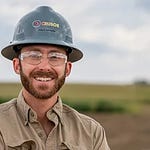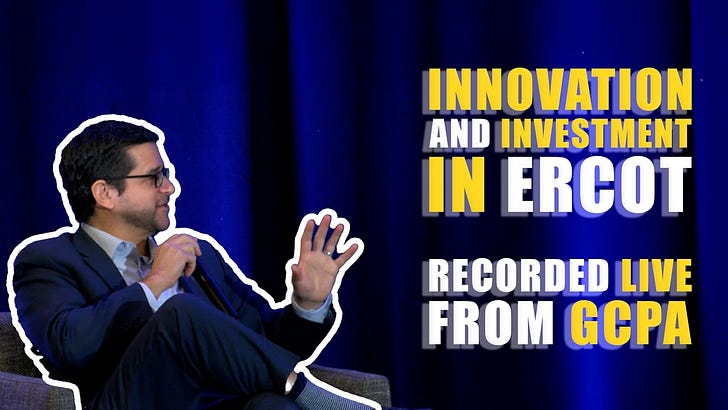If it passed, Senate Bill 819 would be one of the most damaging energy bills we’ve seen in years. It would slow down Texas’ economy, hitting rural areas the hardest. It’s a direct attack on Texas energy producers and a threat to consumers, landowners, and communities across the state. But don’t take it from me, listen to the witnesses from Armstrong, Nacogdoches, Schleicher, and Tom Green Counties.
Two weeks ago, the Senate Business & Commerce Committee held a public hearing on the bill. I’ve watched hearings at the Texas Capitol for more than 20 years, and I’ve never seen this level of public opposition to an energy bill. Over 100 Texans registered their opposition and 50 Texans, from every corner of the state, waited all day to testify in person against the bill.
They spoke clearly and urgently: SB 819 is a mistake.
This post is free but it’s not free to produce it. Please support the Texas Energy & Power Newsletter with a paid subscription. You’ll get access to the full archives, the Grid Roundups, and select Energy Capital Podcasts, including this one with Jane Stricker of the Houston Energy Transition Initiative. Thank you!
The witnesses included ranchers, veterans, landowners, farmers, and local Chamber of Commerce leaders. These are people who live where these projects are actually built and they don’t, as one of the witnesses put it, want Austin to tell them what they can and can’t do with their land.
As I wrote in A Time For Choosing, this bill doesn’t just target renewables. It threatens core principles like private property rights, economic freedom, and private investment in Texas infrastructure.
Take Armstrong County, a rural region with fewer than 2,000 people. Over the life of its two wind farms and new projects, more than $100 million in revenue will flow to local landowners and school districts. And 90% of the county voted for Donald Trump.
In Schleicher County, a county that’s lost more population than almost any other in the U.S., wind and solar have stepped in as oil and gas declined.
In Nacogdoches County, a solar lease is helping one family hold onto their land and send their kids to college; it also funds local schools for the whole community. In San Angelo, oil and gas companies are collaborating with renewable developers to build new projects and attract manufacturers and data centers. Michael Looney from the San Angelo Chamber talked about how he was surprised oil and gas companies were working with solar energy developers. This is becoming even more common.
These aren’t fringe cases. As I’ve written in Clean Energy Boom Is Already Great for Texas, clean energy projects are already creating jobs, tax revenue, and manufacturing growth across the state.
And then there was former Texas Land Commissioner Jerry Patterson. A Republican, veteran, and longtime advocate for gun rights who reminded the committee that renewables have helped keep electricity prices lower in Texas. He warned that bills like SB 819 will drive prices up for consumers and businesses at the exact moment we need more affordable, reliable power.
We’ve already seen what happens when we over-rely on volatile gas markets. In Grid Roundup #47, I wrote about how gas price spikes drove up electricity costs for families and businesses—and why renewable energy is one of the best tools we have to stabilize prices.
We’re at a crossroads. The state needs more electricity. ERCOT has warned of reliability challenges. Data centers, manufacturers, and residents alike are demanding low-cost power. And yet, instead of focusing on transmission, energy efficiency, and modernizing the grid, we’re wasting precious time on bills that would limit development, raise costs, and hurt the very communities they claim to protect.
🎧 I’ll share more audio clips and analysis on the podcast feed, and we’ll also be releasing one-off videos and testimony breakdowns over on our YouTube channel. In the meantime, please share this post, subscribe to the newsletter, and help spread the word about what’s really at stake.
As always, thanks for listening and let’s keep working for a better Texas energy future.
Timestamps:
01:26 - Sen. Menendez & Sen Kolkhorst Exchange
02:19 - Navy Veteran: Sean Salas
05:53 - Rancher & Farmer: Mike Ollinger (Armstrong County)
07:51 - Farmer Brian Zbylot (Nacogdoches County)
10:21 - Conon Emmons, Sen. Sparks, El Dorado (Schleicher County)
14:28 - VP Chamber of Commerce, Michael Looney, San Angelo
17:47 - Former Land Commissioner Jerry Patterson
Show Notes:
Further Reading & Related Posts:
Senate to Hear Another Anti-Energy, Anti-Growth Bill – My preview of the SB 819 hearing, outlining what was at stake before testimony began.
A Free Market, If You Can Keep It – How these proposals conflict with conservative economic principles and market freedom.
To Avoid Power Outages, We Need to Diversify Supply – Why limiting renewable development undermines grid resilience.
More Gas Plants Withdraw From Texas Energy Fund – Notes from the same legislative cycle showing the fragility of supply-side-only strategies.
Clean Energy and Grid Reliability: February 21 Reading Picks – A curated list of articles and podcasts discussing clean energy’s role in supporting grid stability.
Texas Energy Fund and Data Centers: April 2 Roundup – Explores the intersection of energy policy and large-scale electricity demand growth from data centers.
Transcript:
Doug Lewin (00:00)
Two weeks ago, there was an incredible hearing at the Senate Business and Commerce Committee. They heard Senate Bill 819, a bill that would greatly restrict the ability to develop renewable energy in Texas and restrict private property rights—and thus also hurt economic development, particularly in rural areas, drive up energy bills, harm grid reliability. The list of damage from that bill is quite long.
I'm Doug Lewin, host of the Energy Capital Podcast, author of the Texas Energy and Power Newsletter, and today we're going to take you through some of the extraordinary testimonies and moments that were discussed during that hearing.
It really was extraordinary. I've been watching hearings at the Capitol now for over 20 years, and I can't ever remember seeing a bill on anything energy related with half this many witnesses opposed. They registered 100 people opposed to the bill—50 of them testified in person to the committee about their opposition to the bill and anything like it at all. Those stayed around all day waiting for their turn to speak. Again, never seen anything like it.
I want to start with a little exchange between Senator Kolkhorst, the author, and one of her colleagues, Senator Jose Menendez, who's on the committee. Let's take a listen.
Sen. Menendez and Sen Kolkhorst (01:26)
Senator Menendez: "You know, the fact is what makes this country great is we have property rights. And my concern is that some of your setbacks, particularly the 3000 foot setback, that's almost a taking in a sense."
Senator Kolkhorst: "I think 3000 feet is strident. Like when I first did SB2 last session, I didn't even like it when we filed it, but we filed it."
Doug Lewin (01:45)
Pretty extraordinary, right? She filed a bill that she wasn't sure about. She then was thinking that the numbers in her own bill were too strident. Why file it? The whole thing is kind of bizarre and begs a whole lot of questions, but let's hear from the folks who took time out of their lives to come to testify on this outrageous bill.
Let's start with a veteran, a renewable energy worker, and a constituent of Senator Kolkhorst's.
Sean Salas (02:19)
"Chairman, members of the committee, my name is Sean Salas. I represent myself and I'm a constituent of Senator Kolkhorst. And I'm here to oppose Senate Bill 819. I'm a six-year veteran of the United States Navy Special Operations Community from Richmond, Texas, not the city. During my service, like my fellow veteran here, I operated in some of the most challenging environments where energy reliability and security were critical to mission success.
The experience has given me a deep appreciation for the importance of a stable, diverse, and resilient energy grid, something that, in my opinion, SB 819 threatens to undermine. Texas has been a long leader in energy innovation, embracing wind and solar alongside traditional sources to strengthen our grid and create jobs. I've been privileged to work in this industry since getting out of the military to support and raise my family. To that end, I brought my daughter here to show her what it means to be a voice, to fight for something that's important and something that you care about.
This bill places unnecessary barriers on renewable energy development, discouraging investment and slowing progress at a time where energy independence is more critical than ever. The additional permit requirements and fees will stifle economic growth, particularly in rural communities where renewable projects have provided jobs and financial security for landowners and for people like me.
During my time in the Navy, I saw firsthand how dependence on limited energy sources could create vulnerabilities. A strong, self-sufficient Texas should embrace energy diversification, not legislate against it. I urge you to oppose SB 819 and stand for an energy future that is strong, independent, and built on innovation. Let Texas lead, as we always have. Thank you."
Doug Lewin (04:09)
Let Texas lead indeed. Very compelling testimony there from that constituent.
We're going to take a little tour around rural Texas. The next several witnesses you're going to hear from are from rural counties throughout the state, counties that very much rely on the income from renewable energy.
This next gentleman is from Armstrong County. If you probably don't know where Armstrong County is, I'll confess—preparing to record this, I didn't know where it was till I looked it up. But it was the home of one Charles Goodnight, and you'll hear this man say he manages the Goodnight Ranch Wind Farm. Charles Goodnight was a Texas legend cattle rancher. He was actually the inspiration for Woodrow Call in Lonesome Dove. Taylor Sheridan played him on an episode in the series 1883 in the first year of the first season of that series.
In Armstrong County, there are less than 2,000 people. There are less than 400 registered voters. Of those that voted in the last election, over 90% voted for Donald Trump. In that county, over the life of the projects of the two wind farms they have now, there will be over $50 million in payments made to landowners, made to local governments. Another farm under development would add even more money, $120 million combined in tax payments and payments to landowners in a county of less than 2,000 people.
Let's hear from this next witness from Armstrong County.
Mike Olinger (05:53)
"Yes, my name is Mike Olinger. I'm from Armstrong County. I'm a rancher, farmer. I was on the school board for two terms, county commissioner for two terms. We got clean energy. We got schools that need help. We got counties that need it. Y'all don't realize what small counties need. We don't need to be punishing the small counties because we don't have oil and gas. This is the only revenue we've got since 1900, and that was the railroad track. We're strictly ranch land and dry land farm ground. I invite anybody to come to our county and I can show them around."
Doug Lewin (06:32)
Again, really compelling testimony. You heard Mr. Olinger say there, they do not have oil and gas in that region of the state. They do have a lot of wind and sun. And it is very important that they be able to develop that, as he said, for the schools, local governments, the landowners—really vital to the lifeblood of rural communities in Texas.
So that was one of the smallest counties in Texas. Let's switch now to a county in the eastern half of the state that's actually one of the larger rural counties. It's about somewhere around 50 or 60 in rank and population out of the 254 counties in Texas—talking about Nacogdoches County. It is, interestingly, not a particularly sunny part of the state. Again, in the eastern part of the state, not like desert out in West Texas. But you're going to hear this next witness talk about what a solar farm development means for him and for his community, for the schools. This gentleman is a constituent of Senator Nichols, who is on the committee and subsequently voted for the bill coming out of committee, kind of shockingly, against the interests of his own district and constituents, like the one you're going to hear from right now.
Sen. Nichols Constituent (07:51)
"I'm a landowner here. I appreciate you giving me the opportunity. I'm speaking against this bill. I'm a constituent of Mr. Nichols. So this project that you see here is Elia Springs. That was my family farm. Like you, Senator, my kids learned how to work hard there, farming watermelons, 40,000 a summer. That's the reason why I ran out of child labor and they all ran off to college. I'm happy to say I'm still paying for their college with the revenues that we produce from the solar farm.
Nacogdoches County used to be the number one county for dairy production. And then we put it into pine trees and we made money off of natural gas. So I'm here because as landowners, I don't want somebody from Austin—the last time I was here was 25 years ago—I'm here because I don't want people in Austin telling me and George and other rural landowners what we can do with our land. That's why I'm here, because it dramatically impacted our community. We have $30 million worth of revenue coming into our school district now. It changed our community and it changed my family. And I'm thankful that I don't live in California where I couldn't have done this project."
Doug Lewin (09:07)
No one should tell us what to do with our land. Indeed, very compelling testimony there from the gentleman from Nacogdoches County.
We're now going to move over to the western part of the state, to Schleicher County. This county is actually in Senator Sparks' district. Senator Sparks is not on the Senate Business and Commerce Committee, but he is carrying Senate Bill 715, which would be equally damaging to Senate Bill 819 if passed.
Mr. Emmons from Schleicher County talks about how important renewables are to that county—a county of less than 2,000 people out near San Angelo. It is one of the counties that has experienced the most population loss of any county in the entire United States. The renewable projects there have delivered over $100 million in tax payments to local governments and payments to landowners. And there are more renewable projects under development, which would be under threat from Senate Bill 819, but also Senate Bill 715, Senate Bill 388. This whole parade of terrible bills coming from the Senate would put counties like Schleicher County in dire straits. Let's hear from Mr. Emmons.
Conan Emmons (10:21)
“Chairman Schwertner and members of the committee, thank you for the opportunity to speak today. My name is Conan Emmons and I'm a constituent in Senator Sparks' District 31, although I realize he's not on this panel. I'm here to strongly urge you to oppose Senate Bill 819. I'm a resident of El Dorado in Schleicher County, speaking for myself today. I am a landowner and rancher, even though I'm wearing a suit because I thought it was appropriate, and very involved in our community.
In the last 10 years, El Dorado has closed five major oil field support companies. That's a rate of one every two years. The largest remaining one just closed its doors last month. In the same 10 years, my very modest oil royalty check has been cut 95%. Fossil fuel production and supporting companies used to be thriving in our community, but it is a fading resource. And as it fades, so does our community, our population, and our employment.
When an American owned and run company like Apex comes into our community and wants to use wind as a resource, something we have a lot of in Edwards Plateau, it offers hope to our community, not only to the landowners, but to the school districts, the county, the hospital districts, and anyone hoping to stay in El Dorado to find good employment. Senate Bill 819 is a threat to the possibility of a thriving economy and industry in and around communities like ours.
As a landowner, I should have the right to negotiate a lease on my land for hunting, grazing, electricity production, or whatever else I want. ERCOT warns us we must add affordable power quickly to meet rising demands. So I can think of no reason to tie the hands of a company trying to use an abundant resource to fill a much needed demand. And again, I urge you to vote in opposition to Senate Bill 819 and protect landowners' rights and rural economic growth. Thank you for your time."
Doug Lewin (12:14)
That was really compelling to me, particularly talking about the decline of oil and gas in Schleicher County. We're going to hear this story more and more in coming years. It's not that oil and gas aren't tapped out. There's still probably oil and gas down there, but the easy stuff that could be had is had, and we start to see these declines and Schleicher County is kind of a poster child for that. The wind is going to continue to blow and the sun is going to continue to shine. And as Mr. Emmons said, in a place like El Dorado, you need whatever kind of opportunities you have. And why would the legislature try to limit those kinds of economic opportunities in counties that are 80, 90% Republican and desperately need these opportunities?
From there, we're going to move just next door to a nearby county, Tom Green County, where San Angelo is. We'll hear from Michael Looney, who's the head of the Chamber of Commerce in San Angelo. San Angelo has well over a hundred million dollars worth of tax payments, royalty payments from renewable energy. And what you're going to hear that I think is really compelling here is how in places like San Angelo, there is no sense of oil and gas pitted against renewables.
It's all energy. It's all economic opportunity. And I think what happens, unfortunately, in the minds of some politicians in Austin is they think they're doing some solid for oil and gas by attacking renewables. When in fact, a lot of folks in the oil and gas industry work in renewables or work across them. We're seeing this a lot with land men working in both renewables and oil and gas. We're seeing it in the geothermal industry. We're seeing it from landowners who may or may not have had oil and gas royalties but want renewables royalties either on top of the oil and gas royalties or because they don't have oil and gas there.
And so really what you see in most of the state is not this kind of competition, but more of this kind of true "all of the above"—not like when some politicians say it and they really mean to disadvantage one thing or the other, but really truly all of the above. So let's hear about that from Mr. Looney from the San Angelo Chamber of Commerce.
Michael Looney (14:28)
"Thank you. Michael Looney, vice president of economic development with the San Angelo Chamber of Commerce, speaking to oppose this bill. For some perspective, San Angelo is a West Texas city of 100,000 population with a diverse economy relying heavily on agriculture, steel manufacturing, renewable energy, data centers, technology, hardware manufacturing, medical device manufacturing, oil and gas companies, and O&G component manufacturing. We're a quickly growing city with an increasing attraction of new businesses to our region. Kind of an isolated city, so we're kind of designed to self-rescue and self-preserve.
San Angelo and Tom Green County, especially our rural school districts, have greatly benefited from the presence of wind and solar power plants, of which we have three solar power plants and two wind fields in our county. The San Angelo Chamber of Commerce represents the economic development efforts of both the city and the county. And we have been engaged by ranchers and farmers that have benefited from the long-term leases offered by renewable projects. They have demonstrated to us that the land that they lease is surplus, unproductive land. And the renewables developments require no water consumption. They offer an alternative income source for the ranching and farming, cow-calf operations, and they allow the benefit of a backstop source of funding for them from the renewables projects, which keeps the family operations going.
Interestingly, with such a high percentage of our economic horsepower derived from the O&G sector, we have been involved with solar plant projects that were in actual collaboration between the solar developers and O&G companies, which we found intriguing because we'd always presumed that there was opposition to one another, the two different sectors. The presence of our local solar and wind power projects has served to attract several new manufacturers that now have operations in San Angelo and several large-scale data centers."
Doug Lewin (16:31)
Mr. Looney made some really good points there, right? A lot of times renewables are being developed, as he said, on unproductive land, doesn't take water, it still just helps the economy. It baffles me that the legislature is trying to stifle this industry that has meant so much to so many.
We're going to end with testimony from former Texas Land Commissioner and state senator, Republican Jerry Patterson. Commissioner Patterson is well known throughout Texas political circles. He carried the first open carry, not concealed carry, handgun law in the state of Texas and was involved when he went to the land commission office in some of the early renewable deals. He really deserves a whole lot of credit for the development of the renewable industry. And he makes a point that was made throughout the day, but we haven't had a clip on it yet. It's about the reduction in cost for consumers that comes from renewable energy and the increase in bills that are headed your way if Senate Bill 819 or any these other anti-renewable bills pass. Let's hear from Commissioner Patterson.
Jerry Patterson (17:47)
"I'm Jerry Patterson, I represent myself and I oppose Senate Bill 819. So the question is, why should we encourage instead of discourage wind and solar development? And the answer is because we can't afford not to. And when I say afford not to, I mean the positive effects of zero fuel cost generation against the retail price of the commodity to the consumer."
Doug Lewin (18:17)
Commissioner Patterson makes such an important point. Energy bills have gone up in recent years. That's mostly because of increased spending on the distribution grid, but also because of increased cost of natural gas. In 2022, gas was between six and eight dollars. This year, it was two dollars the last year or two, and we saw prices go lower. Gas is back around four dollars, and with some of President Trump's tariff announcements, it's come down a little bit, but we're still seeing relatively elevated prices for gas. It's a volatile fuel. We don't know where its cost is going to go. And we know that having a zero marginal fuel cost, a fuel that literally costs nothing, that bids into the market does have a price-suppressive effect. This is extremely important for businesses that want to come to Texas where energy is one of the biggest inputs, whether you're talking about chip manufacturing, steel mills, petrochemical facilities, data centers—these folks want low cost power.
And by the way, so do residential and small commercial consumers. They need low cost power. In the state of Texas, 35 to 40% of residential consumers self-report choosing between power, medicine, and food. That is unconscionable and unacceptable. And if bills like this were to pass, we would see a rise in energy costs as renewables were, as it were, disadvantaged.
On top of that, we would start to see more energy shortages. We have seen over the last summer or two, and you don't have to take my word for it, ERCOT CEO Pablo Vegas, PUC Chairman Thomas Gleason, talking about how solar and storage in the summertime have kept us out of energy emergencies and conservation alerts. So price suppression, economic development, grid reliability, all of these things are very much at risk with these bills.
Since the hearing occurred, and again, 100 people testified against—50 in-person folks from every corner of the state talking about how this bill would hurt them—the committee passed it out anyway, seven to three. And it will pass on the Senate floor. There's no drama or doubt about that whatsoever. We don't know what the House will choose to do with it. The Senate will pass it. It would be really damaging to the state as you heard from a lot of the witnesses that we played today.
We'll keep track of this. We'll bring you some clips from the Senate floor debate if there even is one. Often in the Senate, there's not because the votes are all there anyway. But if there is, we'll bring that to you. And we'll continue to monitor other energy bills. House Bill 14, which would accelerate nuclear in the state. There are all sorts of energy efficiency bills, transmission bills, distributed energy resource bills. There's so much that legislators could do to make the grid stronger, to lower costs for their consumers and to stimulate economic development. It's sad that they want to spend precious hours of their very short legislative session on bills like these. But here we are.
To follow along, please go to douglewin.com and subscribe to the Texas Energy and Power Newsletter and the Energy Capital Podcast. You can follow me on Twitter, BlueSky, LinkedIn—easy to find on all of those social media channels, but please do go to douglewin.com.
It is a reader-supported publication, and if you can purchase a subscription, that would be greatly appreciated and help support the podcast.
Thanks for listening. See you next time.










